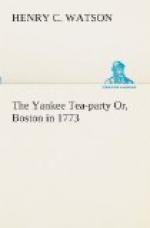Colonel Warner’s regiment. You know after
that skrimmage at Hubbardton, Warner could scarcely
muster more than two hundred men, and we who were sent
from Charlestown were to fill out his regiment.
I found most of the men had been in service since
the war began, and knew what fighting was; and I thought
they were a match for twice their number; but I had
some near neighbours in the regiment of Colonel Nichols
at Bennington: I went and joined him. As
our regiment was filling up, General Stark arrived
at Manchester, where he met General Lincoln, who had
come to conduct the militia across the Hudson to General
Schuyler; but Stark told him that the men were called
together to protect their homes in New Hampshire,
and could not be taken out of that part of the country.
I heard afterwards that General Lincoln informed Congress
of the state of things in our neighbourhood, and that
Congress censured General Stark; but he didn’t
care for that. He knew he was right in staying
in New Hampshire, and that the men who censured him
knew nothing about the state of things there.
Well, we were called upon to meet the enemy sooner
than we expected, for it appeared that Baum, with his
Germans and Indians, was on his march towards Bennington.
Soon after, I arrived at Manchester. About four
hundred men had collected at Bennington, when General
Stark arrived there, and more were coming in constantly.
I guess it was on the 13th of August when we received
information that some of Baum’s Indians had
been seen near Cambridge—that’s about
twelve miles from Bennington. Then there was
a stir among the men, and all sorts of preparation
for a desperate battle. We all knew that we were
going to fight for our homes, and that made us eager
to meet the enemy. All the men of Bennington
who could bear arms joined us, and the old men and
women and boys did all they could to get us information,
and to supply our wants. General Stark sent Lieutenant-Colonel
Gregg, with two hundred men, to check the enemy.
In the course of the night we were informed that the
Indians were supported by a large body of regulars,
with a train of artillery; and that the whole force
of the enemy were in full march for Bennington.
General Stark immediately called out all the militia,
and sent word to Colonel Warner to bring his regiment
from Manchester. Before daylight on the morning
of the 14th of August, General Stark had about eight
hundred men under his command, including Colonel Gregg’s
detachment. We then moved forward to support Gregg.
About four or five miles from Bennington, we met our
detachment in full retreat, and the enemy within a
mile of it. Stark ordered us to halt, and we
were then drawn up in order of battle. Baum saw
we were prepared to make fight, and halted, instead
of coming up to the work like a man. A small
party of our men were forced to abandon Van Shaick’s
mill, where they had been posted, but not before they
had killed a few of the enemy. Stark found that
the enemy were busy entrenching themselves, and he




